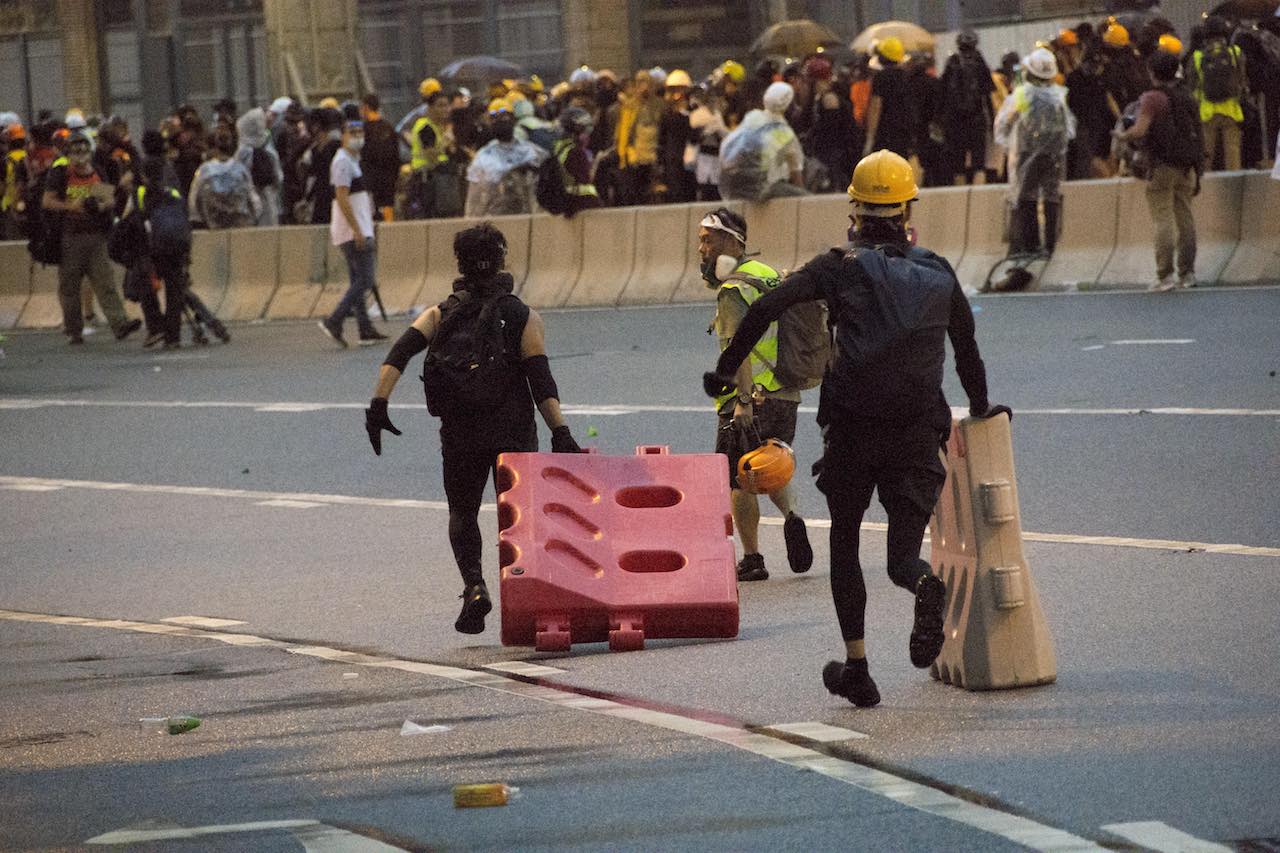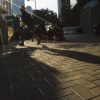Original: 【左翼的失語—當運動和世界和你有所距離時應該如何自處】, published in The Owl 夜貓媒體
Translators: Promise Li, SR, Hung X. L.
If you would like to be involved in our translation work, please get in touch here.
Translators’ note: Tackling burnout is important in any social movement. From the particular to the universal, Thomas Cham talks about the emotional labor of hearing out his friend who feels uncomfortable and depressed about being part of this movement. Sharing this sense of numbness and depression together with a friend becomes the starting point to understand the general affective economy of the Hong Kong left: “As leftists, we always feel this depression (壓抑).”
The author then frames his analysis of the dilemma of the left in this year’s protests with a strikingly personal and quotidian scene: the feeling of dejection and speechlessness when parents do not understand you. The essay asks, what does it mean to be a leftist in this movement, and what are the feelings that come with this role? In the face of the left’s precarious position in the movement, learning to take ownership of this affect of dejection is the first step to building power.
失語 can be commonly translated as “muteness,” or even the medical condition of aphasia. The words can also be literally rendered as “speech loss” or “language loss.” The speaker is alienated from the capacity to articulate speech, and hence, the world is made newly unfamiliar. Cham links this to a feeling of 壓抑—a word that juggles a variety of meanings: depression, negative pressure, repression, stress, and a stifling sense of inhibition. Yet, Cham’s account also takes seriously depression as a social and cultural phenomenon in addition to a biological or medical one; as cultural critic Ann Cvetkovich has articulated, depression is a “public feeling,” a transformative affective tool that undergirds the “slow steady work of resilient survival.” The repetition of double negatives (the left is “not not against the extradition bill”; “But what really troubles people is not that the specific result does not matter”) performs this physical and psychical sense of affective constraint: the speaker is unable to speak in a positive sense that can shift the material conditions.
Cham emphasizes that the leftist’s views are not necessarily wrong or unreasonable in the face of the movement, just as one’s views are not necessarily wrong or unreasonable in the face of your parents. But the objective conditions for change are inadequate and misaligned. He writes:
“We believe that the transformation of ideas has a material basis; we do not try to debate and persuade others in abstract, idealistic terms—this is really a struggle in terms of power. Just like when arguing with parents, you know that your ideas aren’t necessarily unreasonable, but are simply irrelevant in said context.”
The struggle of ideas is embodied and situational. The affective work of listening to a friend’s complaints about the movement, how to deal with being dispirited, with what attitude to relate to friends who do not share the same politics—these are not auxiliary to the left’s organizing platform. Rather they are constitutive of it. The key for the Hong Kong left now is to reflect on and conduct one’s own emotional health sustainably to keep consolidating the movement. In the face of shortcomings in organizational, base building, turning inward to grapple with and overcoming this feeling of estrangement may be the most effective kind of political intervention yet. After all, as feminist theorist Sara Ahmed tells us, the root of a “revolutionary consciousness” begins with an affect of discontent, “Feeling at odds with the world … becoming estranged from the world as it has been given […] you cannot adjust to the world.”
All hyperlinks are included for context by the translators, not the author.
Prologue: When you cannot tell your own story
There are certain moments in life when you do not want to join in a discussion. Disputes with parents are undoubtedly one of those instances. These fights tend to draw fire to yourself quickly, and your parents’ anger would often leave you feeling helpless and speechless.
There are quite a few reasons why you would not want to argue back. Sometimes, you do not really care about the topic. I personally really do not care whether we should get dim sum at Tai Po or eat at Sha Tin, have steamed fish or steamed pork ribs. I just don’t fucking care. Sometimes I get annoyed, and I try to go with whatever and hope that I do not draw fire to myself.
But what really troubles people is not that the specific result does not matter—like choosing between Cafe de Coral and dim sum, or whether we should go up to burn incense at the temple during busy hours—but that you are unable to make them understand where you are coming from. It is not that I am unable to talk about how corporations like Cafe de Coral treat their workers poorly, or that I am unable to make known my discomfort in reinforcing superstition either. Rather, it is the fact that my parents will simply disregard my perspective, and in those scenarios, meaningful exchange with them seems impossible and feels like a waste of energy. Effective communication of ideas requires many preconditions, like proper timing, existing state of the relationship, trust, religious beliefs, knowledge, experience, attitude, and etc. These preconditions simply do not exist in many conversations, and so we fall into a repressive muteness (失語的壓抑).
The left’s depression in the anti-extradition bill protests
The struggle against the extradition bill has already carried on for a number of days. After the June 9 march, a friend of mine wanted to discuss various aspects of the recent movement. To be honest, I still had a lot of work to do for The Owl, which left me feeling quite burnt out. I personally also do not feel strongly about the movement as a whole, thinking that Hong Kong still relies too much on spontaneous mobilization with a lack of organization and planning (though I admit that the reality is that there are not many alternatives in such a short period of time). However, I am interested in discussing how to deal with the anxiety that comes with organizing in the movement, and so I gladly chatted with him online for a while.
As expected, I spent much of our conversation listening and hearing out his complaints. Also a part of the left, my friend has been feeling unusually troubled by the recent events. And it is quite easy to guess why: this movement’s key themes are rule of law and freedom of speech—a liberal conception of rule of law and democracy. Anyone who has seriously listened to left-wing perspectives would have many qualms about the liberals’ insistence on these frameworks. But the enormous resonance of this movement continues to be commandeered by these voices in many ways; the people have clearly been mobilized mainly because of these issues. My friend felt an unusual sense of muteness (異常的失語), not understanding his own position in the movement. Should he not participate in this movement? Wouldn’t that mean alienating himself from the masses? Or should he participate? But not only would he feel unable to foreground left perspectives, he would also feel obligated to echo liberal points of view. He said that listening to people cry out centrist slogans, to the applause of other protestors, made him feel uncomfortable, and even queasy.
Where this muteness began
As leftists, we always feel this depression (壓抑). After all, Hong Kong’s opposition camp is predominantly led by liberals while the left remains in the minority. The best example of this is the kind of mass mobilization that insists on “formal democracy,” or that social welfare is conceptualized in terms of a depoliticized notion of “the people’s livelihood” instead of the political struggle over how resources are distributed (and the establishment still seems to monopolize the banner of protecting peoples’ livelihoods). The public discourse about the movement’s direction remains loose enough for the left to occasionally intervene, such that we are able to point out how obtaining universal suffrage is not enough, find more militant ways to talk about fighting for our rights, etc. Even though our voices are not that effective, there are people who do hear us. We hope to shift the discourse at least somewhat, and try to wage struggle with our words, moving beyond the sensible politics of the liberal framework.
But at times you would discover that it is especially hard to convince others of your platform. During the Moral and National Education controversy in 2012, people felt like they could not talk beyond being brainwashed by the Chinese regime, and we do not have the strength to articulate a leftist program for transforming education. When John Tsang was campaigning to be Chief Executive, I was utterly shocked at everyone’s ridiculous thinking, that a representative from the business sphere would somehow be better than Carrie Lam. But at the time, we were still able to secure our positions despite being in the minority, to simply voice our positions openly.
What impressed me the most was the Asia Television (ATV) controversy. At the time, the movement was gaining decent traction, but it seemed that the left could only operate by defending either government-controlled media channels (ATV) or capitalist ones (new buyers like HKTV); being confined to the narrow room in-between was hard to stomach. I thought at the time that to aim at fighting against monopolies and let the ruling classes fight among themselves was a good thing. But to adequately express this position, especially during the height of the movement, was difficult. Again, perhaps the problem is not that I could not articulate my position clearly, but more that it is difficult to distinguish mine from others’ in a concise way without seeming antagonistic and separatist. It was really difficult to convince others that we must combat the CCP’s encroachment of our media channels while pointing out the problems of capitalist media companies like ATV.
Perhaps the problem is not that I could not articulate my position clearly, but more that it is difficult to distinguish mine from others’ in a concise way without seeming antagonistic and separatist.
In my opinion, the issue of the extradition bill is similar to this ATV controversy (港視事件). The general direction of the movement is extremely precise: opposing this bill because of a distrust of China’s legal system, but the ideological basis for this is a centrist liberal conception of freedom of speech and rule of law. The current movement preserves old methodologies, only this time with more intensity: to mobilize Hong Kongers’ long-standing fear of the CCP. This general sense of fear targets two key aspects: 1) the traumatic memory of repressed freedom in the 1989 Tiananmen massacre, and 2) China’s legal system, corrupt bureaucracy, etc. Even if the former seems too abstract, distant or inactionable, the intense fear of China’s legal system is all the more tangible—the opacity and corruption of state bureaucracy never fail to remind Hong Kongers of the contingency of their freedoms. It works. Even the older, middle-aged generation of democrats has been stirred into action—my mother made a point to tell me that even my father is going to the protest. The youth, even more so, have taken advantage of the somber atmosphere to articulate their own demands and viewpoints. This is the safest way of expressing one’s conscience that best aligns with mainstream opinion. In a sense, this is almost boring.
But the narrow precision of the movement also continues to leave little space for leftist discourse. The left can make some strategic macro-analyses, like trying to imagine the CCP’s master plan toward the city, the trade war with the US, Hong Kong’s impact on Mainland Chinese labor movements, and etc. We can also make interventions from the periphery, like emphasizing the participation of new immigrants in the protests, or reiterating more radical perspectives for the movement’s modes of operation. But on a basic level, the left’s thinking cannot be mapped on to the current struggle. The awkward point for the left is that it simultaneously critiques the deterioration of Hong Kong’s judiciary system as well as the overdetermination of liberal theories of democracy. In other words, we stand in opposition to the establishment like everyone else, but the nuances of our oppositional stance diverge significantly from the mainstream. Now that we have over a million people on the streets, not many will pay attention to the nuances of different oppositional stances in the heat of the moment. At least during the John Tsang campaign people can openly and effectively launch critiques against mainstream positions. But articulating a left critique of liberalism requires a longer conversation, and disagreement with public opinion also runs the risk of looking like antagonism against the movement. At the same time, you are not not against the extradition bill—essentially, you inhabit a paradigm of thought apart from the conflicting realities of the movement. Hence anxiety, depression, muteness.
Facing our weaknesses
Then how should we conduct ourselves as the left? How can we resolve the tension between our standpoints and those of the majority of the masses?
The left insists on different values, and these are not limited to just explicitly anti-capitalist or pro-working class principles. One particularly important contribution to the movement is our ability to analyze and understand the maneuvering and struggle of social power (社會權力的更替和對抗). We believe that the transformation of ideas has a material basis; we don’t try to debate and persuade others in abstract, idealistic terms—this is really a struggle in terms of power. Just like when you argue with parents, you know that your ideas aren’t necessarily unreasonable, but are simply irrelevant in the said context. If this still feels abstract, one can return to what I said above, “After all, Hong Kong’s opposition camp is predominantly led by liberals while the left remains in the minority.” I mean minority not only in terms of numbers, but also in terms of the ongoing challenge to propagate left voices effectively in concrete scenes of struggle within the movement.
Like many other previous movements, liberal ideas frame these protests, and it is in fact quite natural to find it difficult to build left perspectives. We must accept this point honestly. This weakness lies not only in the spread of ideological thought, but also in the lack of labor organizing (like the weakness of labor unions, their absorption into and subjugation by larger structures, and the composition of the Civil Human Rights Front) and a lack of presence in the societal superstructure (for instance, the legislative body), all of which results in a lack of analytical authority. Our interests are either easily neglected (Moral and National Education controversy), or in conflict with the people, making any persuasion all the more difficult (Tsang campaign). In another scenario, although we have essentially similar demands as the people, we are unable to clearly articulate our position, making it difficult for us to play any more than an auxiliary role in the movement (ATV controversy, anti-extradition bill protests).
Articulating a left critique of liberalism requires a longer conversation, and disagreement with public opinion also runs the risk of looking like antagonism against the movement.
If the Hong Kong left were strong, the current anti-extradition movement would not have manifested as such. The movement would not idealize liberal notions of rule of law, but would point out how the people have been oppressed by the law. Addressing class conflict would be intrinsic to the movement: Mainland Chinese bourgeoisie face a different kind of pressure from the law than the Chinese working class, and the CCP’s legal apparatus has been used to attack labor NGOs in China and Hong Kong. The movement would be centrally led and supported by left organizations, mobilizing Hong Kong’s lower classes as a whole and enkindling their rage against wage disparity and labor injustices. It is in this type of movement that the left’s perspective toward democracy and the rule of law can be more easily distinguished from that of the liberals. We would be able to play an important role in the concrete struggle and let our ideas transparently and effectively pervade the ranks of the people. But we do not live in that possible world, a world in which this political movement would be a reality.
And so, we must learn to accept the limitations of our objective conditions. This does not mean we have nothing to do. We can continue to fill in our analysis from the side, like providing tactics for struggle, strengthening the movement’s international analysis, and encouraging the participation of new immigrants, among other things. I am glad that some of this work is already being done by many on the left. Nonetheless, we have to admit that we are not currently in a position to influence the movement in more powerful ways, and that we do not have the clearest and most distinguished perspectives in the movement’s ranks. We can try to clarify our ideas, but mainly through subtler ways (for example, this article itself is no manifesto), and our best means of communication now is through internal distribution through our existing organizations. This means that we have not been able to affect that many people and lead the direction of the movement, but that is precisely what our weakness entails.
The inability to deal with this muteness and depression often makes us dispirited, leading some to even leave the mass movement and organize campaigns that fit only one’s own inclinations. But what younger leftists always forget is that Hong Kong liberalism only achieved its hegemonic position today, besides having the support of global capital, because of decades of organizing work since the seventies and eighties. This work extends across the border into supporting some of those oppressed in Mainland China, most exemplified by the sacrifices of Tiananmen Square in 1989 and the solidarity work of liberal political organizations in Hong Kong.
At this time, the left’s development is most likely not going to leap to power with one fell swoop. We must remember that this may take twenty years or more of organizing—we need to have this patience and understanding without retreating from the mass movement. We must stand with the masses, and slowly persuade them of our perspectives. We may discover that we may not be able to popularize the perspective of the left in every single movement or struggle.
Clarifying our positions does not mean losing ourselves in the masses
But what also terrifies us is that the inability to deal with this muteness can lead to distorted and imprudent actions: in order to foreground standpoints from the left, some will aggressively pit themselves against the masses. Yes, we despise that liberals uncritically place universal suffrage, rule of law, and democracy on a pedestal; but some would cast aside the whole movement on the basis that these ideas are merely capitalistic and simply protect private property… which is truly absurd: liberalism has countless limitations, but there are more valuable principles which overlap with our positions than some may realize. We cannot forget the historical complexities and theoretical contradictions between left-wing, socialist ideas and liberalism.
These kinds of sectarian attitudes would further splinter the left. They are unhealthy attitudes that deny or fail to recognize the material limitations against which ideology spreads and circulates. We must work with these limitations, strategize carefully, and slowly broaden the influence of left-wing thinking, without demarcating a line between us and the masses. Otherwise, this would be the easiest way for the left to be alienated from the masses—unable to be understood and recognized, uncritically radicalizing the situation and criticizing all other positions as liberal and reformist in order to distinguish its position as the only correct one. This is the old story of far-left sectarianism.
Of course, the other trap is losing one’s principles by trying to stay as close to the masses as possible. Navigating this fine line requires ingenuity. But we can begin by self-reflecting on some basic questions: are you trying to sway the masses? Are you only asking for their gestural support? When you recognize problems with other people’s ideas, what would you say, what attitude do you adopt to speak with them? Are you only speaking with a mind to criticize and distinguish your ideas from them to make yourself feel better? Are you mindful of explaining your ideas carefully with those who may not agree with you? It is not only about holding or not holding our viewpoints. It would only be fair if we are all willing to grapple with the complicated details of our ideas and the shifting realities of the movement.
We believe that the transformation of ideas has a material basis.
For example, as for the mobilizations right now, it is true that people are over-glorifying liberal ideas of democracy, and the critique of the Communist Party remains superficial, framing the situation as merely one of authoritarianism versus democracy while neglecting any class analysis. I can raise two more points: firstly, this movement’s basic structure did not quite reflect on the past and focused on pure mobilization without building organizations; secondly, based on poll results, although “low-income” (低收入) and “low-education” (低學歷) citizens more often oppose than support the protests, this opposition reaches below half of those surveyed. This is a classic indication of a movement that is becoming bourgeois. We must not blindly follow mainstream discourse on these points—we must articulate our thoughts on these weaknesses as the left. But to express them does not entail utterly condemning the movement, and dictating what to do from above. We can begin to distinguish left and liberal ideas this way, but it still remains difficult to see how we can influence the movement; and in reality, leftist perspectives toward liberalism’s focus on rule of law and freedom are not completely black and white either. “Mainland China’s judiciary indeed has many problems, and protecting the freedoms Hong Kongers have is important, but hasn’t the Hong Kong government also been leveraging our ‘rule of law’ to persecute organizers of the Umbrella Movement?”—wouldn’t this be an accurate and even more powerful way to speak about this issue?
Conclusion
If the weakened Hong Kong left wants to expand its influence, it must not alienate or lose itself in the masses. Instead, learning how to deal with that sense of depression and muteness would be crucial. This requires emotional work rather than any political judgment. But I think many people already understand this sentiment—like in their experiences with their parents. Everyone must understand that sometimes it is impossible to clearly and effectively express one’s position to their parents, because one’s own experiences and thinking are so far from theirs. To convince my mom that she doesn’t need to burn her incense requires a longer conversation than an immediate argument. Of course, the most common way of dealing with parents is to give up on communicating: I admit that I also tend to do this. But while most parents will keep nagging you to come back home for dinner, the masses would simply leave. There are many things more important than where to eat or whether to burn incense—things that we cannot afford to give up.







